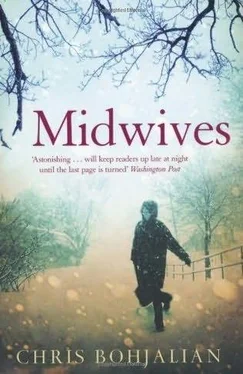Chris Bohjalian - Midwives
Здесь есть возможность читать онлайн «Chris Bohjalian - Midwives» весь текст электронной книги совершенно бесплатно (целиком полную версию без сокращений). В некоторых случаях можно слушать аудио, скачать через торрент в формате fb2 и присутствует краткое содержание. Жанр: Современная проза, на английском языке. Описание произведения, (предисловие) а так же отзывы посетителей доступны на портале библиотеки ЛибКат.
- Название:Midwives
- Автор:
- Жанр:
- Год:неизвестен
- ISBN:нет данных
- Рейтинг книги:5 / 5. Голосов: 1
-
Избранное:Добавить в избранное
- Отзывы:
-
Ваша оценка:
- 100
- 1
- 2
- 3
- 4
- 5
Midwives: краткое содержание, описание и аннотация
Предлагаем к чтению аннотацию, описание, краткое содержание или предисловие (зависит от того, что написал сам автор книги «Midwives»). Если вы не нашли необходимую информацию о книге — напишите в комментариях, мы постараемся отыскать её.
Midwives — читать онлайн бесплатно полную книгу (весь текст) целиком
Ниже представлен текст книги, разбитый по страницам. Система сохранения места последней прочитанной страницы, позволяет с удобством читать онлайн бесплатно книгу «Midwives», без необходимости каждый раз заново искать на чём Вы остановились. Поставьте закладку, и сможете в любой момент перейти на страницу, на которой закончили чтение.
Интервал:
Закладка:
Three minutes later Charlotte's blood pressure had slipped to seventy-five over fifty, and the baby's heartbeat had slowed to sixty or seventy beats per minute. The vaginal bleeding had become a small, almost imperceptible trickle, and then stopped completely… but the wet sheets were a reminder of the size of the earlier wave. And so my mother said to the two parents in the room with her that it would be in both Charlotte's interest and the child's interest to have the baby in a hospital. She said-and apparently her words were at once appropriately dispassionate and concerned-there was a chance the placenta was detaching itself from the wall of the uterus. This meant, she explained, both that their little baby wasn't getting the sustenance it needed, and Charlotte might be bleeding inside.
My mother never came quickly or lightly to the decision that one of her patients should go to a hospital, but she also never hesitated to have a woman in the midst of dangerous complications deliver her baby with modern medicine's extensive safety net unfurled below her. For one reason or another, Sibyl Danforth took roughly one out of every twenty-five mothers to the hospital before March 14, 1981.
Both she and Asa later testified that had the phones been working that night, things might have ended differently. Unlike some parents who would plead with my mother to let them keep trying, parents who either loved the idea of a home birth so much or hated hospitals with such extreme loathing that they would labor for hours despite the danger, the Bedfords readily agreed they would venture to the mechanized, metal-railed birthing beds and sterile operating rooms of the North Country Hospital in Newport.
My mother picked up the phone in the bedroom to dial the rescue squad (and back then most phones in the Northeast Kingdom indeed demanded that one literally dial them) and discovered there was no purring tone. Reflexively she pressed the twin buttons in the receiver's cradle and she checked the connections: the connection of the cord to the telephone itself and the jack near the base of the wall. When she saw that both were attached, she suggested that Anne test the phone in the kitchen downstairs. A moment later Anne called up the stairs to inform my mother that the phone on the first floor wasn't working either.
"It's gone, too!" she cried up to them, and both my mother and Asa detected panic in the young woman's voice, panic they hoped Charlotte hadn't heard. Clearly, however, she had.
Rain and hard crystals of ice had been rapping against the bedroom windows for well over an hour now, although my mother said she had only become aware of the sound immediately after Anne yelled the bad news from the small entryway at the foot of the stairs. After the apprentice had discovered conclusively that the phones were down, Charlotte grew quiet with fear, and the insistent rain and ice against the glass sounded, my mother would say on the witness stand, "like someone was heaving handfuls of gravel as hard as they could, as if they were trying to shatter the glass."
My mother called Anne back to the bedroom to keep Charlotte and Asa company while she went outside to warm up her car: Her station wagon was bigger than the Bedfords' little Sunbird or Anne's tiny Maverick, and Charlotte would be most comfortable in it.
How slippery had the ground become? My mother's struggle across the bluestone walk Asa had built and across fifteen yards of driveway to the spot where she had parked her car would have been comical if it hadn't been so painful. Three days later, on Monday, her attorney had the bruises-still black and blue and ugly-along both of my mother's legs photographed. They also took pictures of the long cuts along the insides of her hands, and the sprained and swollen ankle around which she would wear an Ace bandage for weeks and weeks.
She fell four times, she said, before she crawled on her hands and knees to her automobile, and then pulled herself to her feet by holding on to the front door's metal handle. Yet she still planned on driving Charlotte to the hospital, and began by attempting to bring the car right up to the front steps of the house-yard and bluestone be damned-so Charlotte wouldn't have to walk along the ice rink that had overtaken the Bedford property. As she pressed her foot down slowly upon the accelerator, the car's tires spun in place like immobile carnival wheels, before abruptly pushing the automobile forward and then twisting it almost three hundred and sixty degrees. It slid into the remains of an ice-covered snowbank one of Asa's parishioners had built while plowing the driveway throughout the winter. And although my mother's car wasn't damaged, she knew it would be impossible to drive to the hospital.
If my mother cried-and it seemed to me that she had every right to as she pushed open the car door and rolled onto the ground to begin her return to the Bedfords' house-she had stopped by the time she rejoined Charlotte and Asa and Anne. But she said later she'd cried. She had birthed dead babies before, little stillborn things whose souls, in her mind, had gone to heaven before their flesh had known a world bigger than a womb, but experience didn't make the ordeal any less sad. She said she always cried for those babies and for their parents, and she feared now that the baby inside Charlotte would die, and the Bedfords would lose their second child. (Later, the State's investigation would reveal that babies had died three times in my mother's care prior to March 14, 1981, or almost exactly as often as it happened to women in the care of obstetricians.)
My mother testified that although the ground was slick with ice, there was a dusting of snow sticking to the grass, and when she saw it she imagined the vernix covering the body of the Bedfords' spiritless, unbreathing little baby. She imagined that baby was a boy.
But although my mother feared they would lose the baby, she said it never crossed her mind that Charlotte Fugett Bedford would die. She knew she could stop the bleeding once she had delivered the baby (dead or alive), and surely the phone lines would be quickly fixed. She reminded herself that the woman would have to lose six or seven or even eight pints of blood before cardiac arrest would occur, and that, in my mother's view, was a lot of blood.
And she knew in her birthing bag she had syringes, and glass vials of Pitocin and Ergotrate-drugs that caused the uterus to contract hard, and could sometimes control internal bleeding. Of course, it was illegal for her to have these regulated substances in her possession, but every midwife carried them. My mother wasn't unique.
Nevertheless, the image of Sibyl Danforth running around northern Vermont with a big bag full of illegal drugs and syringes wasn't a helpful one in a court of law.
Ironically, when my mother returned to the Bedfords' bedroom, Charlotte seemed better. Her blood pressure was returning to normal, as was her baby's heartbeat: one hundred, one-ten, then a reassuring one hundred and twenty little thumps per minute. Charlotte had stopped bleeding, and she certainly wasn't showing any symptoms of shock. Her skin wasn't clammy, her complexion seemed fine, her attitude was good. There would be no need, after all, for oxygen or an intravenous drip. There would be no need for Pitocin.
"I believe I am fine now, Sibyl," she said, the weariness in her voice tinged with hope.
Charlotte may have meant to convey nothing more with this statement than the idea that her pain, for the moment, had become tolerable. Bearable. Endurable. But in Charlotte's tone my mother had heard more. In Charlotte's voice my mother had heard a loving testimony to the power of prayer: As my mother had been slipping so badly outside among the falling drops of cold water and ice that each step since had caused her an excruciating splinter of pain, Asa and Charlotte and even Anne had prayed. Asa had knelt by the side of his wife's bed, her long, pallid fingers wrapped in his hands, and together they had prayed for her bleeding to cease and her pain to subside; they had prayed that the baby inside her would live, and their lives would be blessed by its presence.
Читать дальшеИнтервал:
Закладка:
Похожие книги на «Midwives»
Представляем Вашему вниманию похожие книги на «Midwives» списком для выбора. Мы отобрали схожую по названию и смыслу литературу в надежде предоставить читателям больше вариантов отыскать новые, интересные, ещё непрочитанные произведения.
Обсуждение, отзывы о книге «Midwives» и просто собственные мнения читателей. Оставьте ваши комментарии, напишите, что Вы думаете о произведении, его смысле или главных героях. Укажите что конкретно понравилось, а что нет, и почему Вы так считаете.











